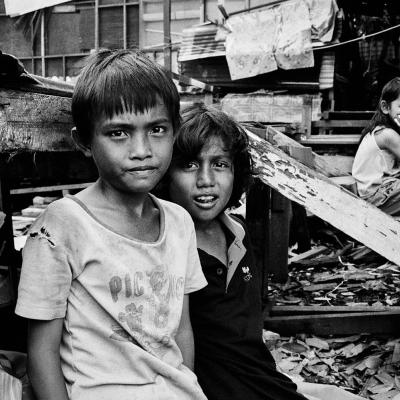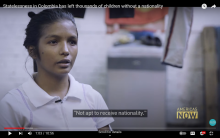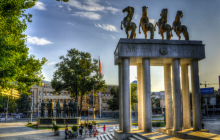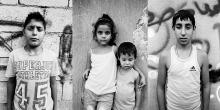“I was denied my birth registration as a child and later at the age of 16, I was also denied a right to citizenship through my mother. And with that, I lost my happiness, my security, my confidence, and my dream to become a medical professional. All at once!”
Neha Gurung, Citizenship Affected People’s Network, Nepal
KEY MESSAGES
- Intergenerational statelessness is the leading cause of statelessness globally. On average, more children are born stateless each year than the number of stateless people who are able to acquire a nationality.
- All children have the right to nationality and statelessness is never in the best interests of a child. All states have an obligation to ensure no child is born stateless within their territory.
- Legal safeguards to prevent childhood statelessness are lacking in 60 countries globally and where they do exist, they are often ineffective in practice
- Realizing the child’s right to nationality is critical to ensure their unhindered enjoyment of other rights such as education and healthcare.
- Many stateless children do not hold identity documentation and may not have their births registered. This puts them at heightened risk of abuse, exploitation, child labour, trafficking, child marriage and recruitment into armed forces.
- Without a nationality, stateless children can also struggle to develop a sense of belonging, which aggravates the impact on statelessness on their mental health.
CHILDREN AND NATIONALITY
Which nationality a child is entitled to at birth depends on who their parents are, where the child is born and what the laws of these countries say about the conferral of nationality. Nationality is usually acquired either by descent (jus sanguinis) or by birth on the state’s territory (jus soli), or through a combination of both. Most children acquire their nationality immediately after birth, often automatically and without any difficulty. However, this is not the case for all children. When a child does not acquire any nationality at birth or loses their only nationality during childhood, this makes them stateless.
When a child lacks a nationality, this creates a situation of severe disadvantage, vulnerability and marginalisation. Even though child rights should be enjoyed by all children, regardless of whether they have a nationality or not, in our modern world, nationality often operates as a legal or practical gateway to the enjoyment of other rights. Statelessness undermines the child’s opportunity to develop to his or her full potential because of the significant impact it has on all other rights, including their access to education, healthcare, free movement, and family life. Nationality also fosters inclusion and a sense of belonging within the society and so stateless children can struggle with questions about their identity and place in the world, affecting their feelings of self-worth. Statelessness and the disadvantages that it creates have the tendency of becoming entrenched and if their situation is not resolved, stateless children grow up to be disenfranchised and excluded as adults too.
CHILDHOOD STATELESSNESS
THE SCALE OF THE ISSUE:
Childhood statelessness is a significant worldwide problem. At least 15 million people are stateless globally, with many more whose nationality is at risk and an estimated of those affected by statelessness are children. Inherited or intergenerational statelessness – where it is passed from parent to child – is the leading global cause not just of childhood statelessness, but of statelessness generally. In any given year, more children are born stateless than the number of stateless people who are able to acquire a nationality (in the absence of fresh, large-scale situations stemming from other causes). This means that situations of statelessness endure and even grow over time; that most new cases of statelessness affect children from birth, who may never know the protection of nationality; and that stateless groups often suffer from intergenerational marginalisation and exclusion. It is easier to resolve statelessness immediately at birth or during early childhood than later in life. As such, it is essential to tackle childhood statelessness to remedy statelessness more broadly.
SAFEGUARDS AGAINST CHILDHOOD STATELESSNESS:
With the exception of the Americas region, most countries require at least one parent to have nationality for the child to become a national at birth. However, international law requires states to grant nationality to any child born on their territory if they would otherwise be stateless. At least 60 of the countries that do not have a generally applicable jus-soli based provision for children born in the country to acquire a nationality fail to provide such a safeguard to grant nationality to otherwise stateless children. Many more have inadequate provisions in their nationality laws, with safeguards that cover only certain children (like the Netherlands where there are additional criteria to meet), or a safeguard that is not (Syria) or not well (South Africa) implemented in practice. Other gaps in law, like failing to ensure access to nationality for an abandoned child – a ‘foundling’ – can also cause childhood statelessness. Across the globe, 27 States do not have a provision in their nationality laws to grant nationality to children of unknown origin found in their territory, nor a more generally applicable jus soli provision. At least 50 States have inadequate foundling provisions in their nationality laws.
DISCRIMINATION:
Discrimination is a key driver of childhood statelessness. For example, gender discrimination can lead to statelessness if mothers are denied the right to confer their nationality on their child, leaving the child dependent on the father for citizenship. However, in cases where the father is unknown, stateless or does not accept paternity, the child is left unable to acquire nationality and will be born stateless. Children are also affected by laws, policies and practices that lead to the denial or deprivation of nationality on the basis of ethnic, racial or religious discrimination, which can leave entire communities, including children, stateless. Children in emergency settings – both children on the move (migrants, refugees, unaccompanied minors) and children affected by armed conflict – can also be at risk of statelessness. Children may lose their nationality through the actions of their parents, in countries where the law provides for loss or deprivation of nationality to be extended to a person’s dependents.
BIRTH REGISTRATION:
Lack of birth registration can also put a child at risk of statelessness because it can make it difficult to establish who the child’s parents are or where the child is born – the two key elements necessary to determine entitlement to nationality. This risk is particularly significant for unregistered children born within migrant, refugee, minority, nomadic or border communities, whose claim to nationality may be more readily contested.
PROTECTING EVERY CHILD’S RIGHT TO A NATIONALITY
INTERNATIONAL FRAMEWORKS:
The Universal Declaration of Human Rights recognises the right to a nationality. This right is reaffirmed specifically for children across a number of the core UN human rights conventions, the 1961 Convention on the Reduction of Statelessness, and several regional treaties. The Convention on the Rights of the Child (CRC) articulates the right to a nationality of every child in its Articles 7 and 8 - obligating states to take measures to avoid cases of childhood statelessness and to help children to (re)establish their identity, including nationality, if deprived of it. The other rights contained in the CRC must also be available to all children, irrespective of their nationality, immigration status or statelessness. The CRC’s guiding principles – in particular non-discrimination (article 2) and the best interests of the child (article 3) – help to guide the content and implementation of the right to a nationality and measures that affect stateless children. Statelessness is never in the best interests of a child.
COMMITTEE ON THE RIGHTS OF THE CHILD:
Through its monitoring role, the UN Committee on the Rights of the Child is uniquely placed to enhance the visibility of childhood statelessness as a human rights issue, improve the enjoyment of rights by stateless children and ensure every child’s right to a nationality. For example, the Committee has clarified that Article 7 of the CRC requires states to grant nationality to all children born on their territory if they would otherwise be stateless regardless of their or their parents’ legal status, background or their parents’ past opinions or activities. In the period 2010-2020, the Committee engaged with the child’s right to a nationality and childhood statelessness in over 70% of its recommendations to states when reviewing the implementation of their obligations under the CRC and its continuing engagement covers an array of issues relating to the right to nationality and childhood statelessness.
Guidance to states from the UN Committee on the Rights of the Child, as well as jurisprudence of the UN Human Rights Committee and at the regional level in Africa and Europe, has further clarified the importance of resolving uncertainty relating to a child’s nationality. This should happen as early as possible. If a child’s nationality cannot be established immediately or very soon after birth, when the evidence of who their parents are and where they were born is strongest, it becomes increasingly difficult to do so as the child grows older. Without help early on, a child is more likely to be left stateless and may live their entire life without a nationality and one day have children who are also denied a nationality.
UN AGENCIES AND INITIATIVES:
UNHCR and UNICEF hold global mandates to address statelessness and protect the rights of all children respectively. Each has participated in the production and issuance of further guidance on international norms for the avoidance of childhood statelessness and how to promote the protection of the child’s right to a nationality. The two agencies also joined forces in 2016 to launch the Coalition on Every Child’s Right to a Nationality. The UN Sustainable Development Goals sets out goals for States, which though technically require structural change, can also help to prevent childhood statelessness – for example target 16.9 which focuses on the provision of legal identity and birth registration. International campaigns, such as the Global Campaign on Equal Nationality Rights pursue advocacy avenues intent on ending gender discrimination in nationality laws, which has an indirect impact of preventing childhood statelessness; and an increasing number of civil society groups, local organizations, academics and activists engage with this issue in their daily work.
[Last updated: January 2024]
Cover image by Greg Constantine
Further reading
Voices & Experiences
-
Statelessness in Colombia has left thousands of children without a nationality
![columbia]()
-
Discrimination against Roma in accessing birth registration in North Macedonia
![North Macedonia]()
Discrimination against Roma in accessing birth registration in North Macedonia
![North Macedonia]()
“Four [of my] children don’t have birth certificates because I didn’t have money to even survive when they were born… I knew that I have to register them. They were born at home. I started a procedure for late registration, and for the past 10 years I can’t register them. I was required to provide many documents. They asked for DNA analysis which is expensive and we could not pay for it…The problem was mostly due to the fact that we didn’t have money to pay for the analysis.”
Affected person
Voice from https://www.institutesi.org/resources/roma-belong-western-balkans-and-ukraine
(page 31)
-
Children’s Identity Rights in the Context of Children on the Move
![Children]()
Children’s Identity Rights in the Context of Children on the Move
![Children]()
“I was lucky enough that I finally got the Cuban citizenship at just age 11 in 2019, some people grow up until they are old and they have to live with that forever”.
Daniela
Daniela was born in Cape Town in 2008 and her parents had immigrated from Cuba in 2016. When Daniela was born, her parents were no longer residents of Cuba or citizens of South Africa which resulted in Daniela being born stateless. She could never travel with her parents due to not having any way to identify her as she was not registered on any database. Daniela also mentions how children’s mental health would be improved if Home Affairs was aware of the issues such as anxiety and stress caused by the long process of reappealing. She expressed her views and made a suggestion to make the appeal process shorter to help others appealing and their situation. This demonstrates her agency in the face of her own experience of this process. Liesel Mueller from the centre for Child Law, University of Pretoria, worked on Daniela’s case and enabled her to have Cuban citizenship and the right to a South African citizenship.
Voice from https://youtu.be/kfhX4whR7-o
Latest Resources: Children
-
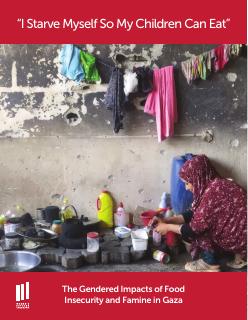
“I Starve Myself So My Children Can Eat”: The Gendered Impacts of Food Insecurity and Famine in Gaza
Type of Resource: Report
Theme: Women
Region: Middle East and North Africa
View -
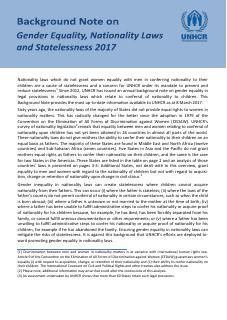
Background Note on Gender Equality, Nationality Laws and Statelessness 2017
Type of Resource: Report
Theme: Women
Region: Global / Other
View -

Article: Burkina: To regain their identity, ghost children wait for civil status to decide between two technologies
Type of Resource: News/ Media reporting / Blog
Theme: Children
Region: Africa
View
